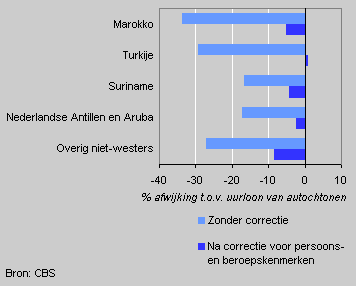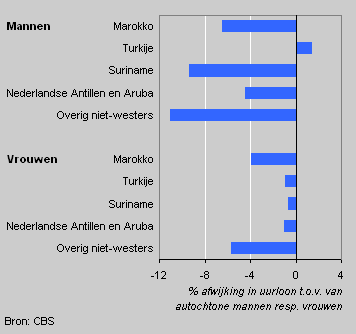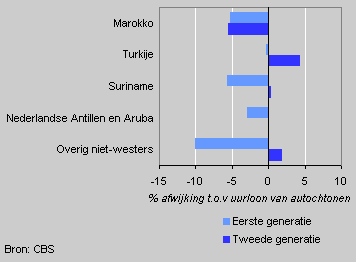Do employees with a foreign background get equal pay?

Differences in hourly wages between native and non-native employees can largely be explained by differences in age, education and job levels. When these are taken into account, the hourly wages of Turkish and Antillean employees are virtually identical to those of the native Dutch employees. The hourly wages of Moroccan and Surinamese employees are slightly lower. The differences are mainly found among male employees.
Hourly wage differences between employees by origin, 2002

Wage differences disappear by adjustments
The average hourly wages of non-western employees on 31 December 2002 were well below that of native Dutch employees. This varied between 17 percent among Surinamese to about 30 percent among Turkish and Moroccan employees. The hourly wages, however, are not easily comparable. For instance, the native employees are on average much older than the non-native employees, which makes their wages higher. Differences in education and job levels are another influence.
When these differences are taken into account, the wages of native and non-native employees are much more similar. In that case Surinamese and Moroccan employees earn about 5 percent less than native Dutch employees, whereas the wage difference has disappeared for Turkish and Antillean employees. The wage difference is greatest for the group other non-western employees.
Adjusted hourly wage differences by origin and sex, 2002

Women have equal wages more often
After adjustments the remaining difference between the wages of female non-western and native employees is not great. Only Moroccan and other non-western women earn about 5 percent less.
The differences among men remain greater after the corrections. The greatest wage difference, about 10 percent, was found among male Surinamese and other non-western employees. Turkish men were the only ones that had hourly wages comparable to native Dutch men.
Adjusted hourly wage differences by origin and generation, 2002

Second generation overtaking the first
Among the first generation immigrants, born abroad, only the Turkish and Antillean employees earned about the same wage levels as native employees. The others earned on average 5 to 10 percent less. The second generation hardly has any wage discrepancies. Only Moroccan employees earn a few percent less than native Dutch employees. The second generation is born in the Netherlands. This makes their position on the job market more similar to that of the native Dutch population. However, as a group they are young. As they get older it remains to be seen if their wages stay comparable, given equal education and job levels with those of the Dutch native employees.
Rik van der Vliet